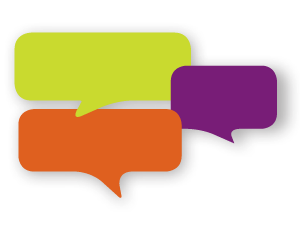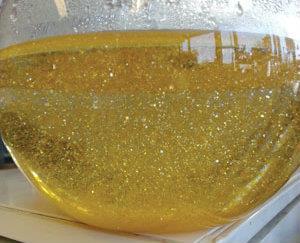Discussions from the magazine, website, blog and social media

Golden rain
In the last issue’s Exhibition Chemistry, Declan Fleming described how to use the golden rain demonstration, precipitating lead iodide, to teach ionic bonding. Andres Tretiakov (@andrestrujado) tried the experiment in his classroom and sent us a photo:
Fantastic golden rain demo! The crystals really look like gold (foil).

Mike Ryan (@MRyanBLS), a chemistry teacher in the north of England, took the demonstration a step further and used it as an example of the usefulness of the Gibbs free energy equation:There is a choice between being free ions in solution or packed as the solid. I had the students consider the likely enthalpy and entropy changes going between the two states. No actual values were used but they spotted that both enthalpy and entropy changes would be negative in the direction of forming the solid. So, there must be a certain temperature above which the solution would be favoured over the solid. It also helped to emphasise that sometimes kinetic factors can get in the way of the thermodynamic argument because the crystals didn’t suddenly dissolve at the key temperature.

And on Twitter, Mike went on to show us how he’d tried expanding the demonstration further:
After ‘failure’ with silver chromate, lead bromide gave white needle-shaped crystals Have you tried this demonstration? What did your students think?
Student blogs
On our blog in February Peter Banks explained how and why he asks his A-level students to write their own blogs. Teachers loved the idea and had follow up questions for Peter.
Wbrewer asked:
What a great idea. I’ve got so many directions that I would like to take this. My two questions are ‘how often do you read/assess their blogs and how long does it take?’
Peter replied:
I’ve found this to be a very effective and quick way of assessing pupil work. I find it very quick to load up their websites and read through what they’ve produced, I do it around twice a week. I must admit to being very lucky as I have very small classes, so I feedback in person giving very brief notes if needed.
Personally I’ve found that I can look through blogs a bit quicker than conventional or written methods, possibly because I can pull them up at any time and in any place (mobile phone, on the tube, middle of a lesson etc).
Margaret Guyan, a teacher in the Philippines, said:
I love it! Think this might be just what I need to get my bunch thinking more about research. Got any basic instructions for a technophobe like me?
Peter responded:
Hey Mags, go for it! Just try signing up at WordPress, perhaps make a quick blog for yourself for a week and then you’ll know how to use it.
Rosalyn Klein, a lecturer at Rhodes University in South Africa, commented:
I really like this idea! One of my colleagues used a blog as an exam question, and got some interesting results. Public communication of science is so important, and such a vital skill for our students to develop, that makes this a wonderful opportunity.
Take a look at the comments on Peter’s blog to find out how he deals with comments and moderation.
In defence of textbooks
Also on our blog in February, Kristy Turner examined the role of textbooks in learning.
There was much discussion by teachers, both for and against their use in the classroom. For example, Mike Parsons (@polarity10), a chemistry teacher in Ontario, Canada, had this to say:
There is no defence for the continued use of textbooks as they are not part of the real world. The real world evolves. Students learn in different ways today. There will be no textbooks ten to fifteen years from now.
However Alfredo Tifi (@tifialf) in Italy disagreed:
The need to understand written text and to reflect is increasing and will be still important in 15 years and more.
Mike asked:
Where did you get the data that the need to understand written text is becoming more important?
Alfredo replied:
Just a trend in 30 years of teaching in the same age range and diminishing autonomous reading with comprehension skill.
Mike said:
Text can come from many sources other than textbooks.
Alfredo responded:
OK. Critical reading is facilitated in textbooks. If you fail to understand them you have no chances in other contexts.
Kuda Murombedzi, a teacher at Livingstone Kolobeng College in South Africa, gave us his experience:
I have been following the discourse on the classroom of the future and everything seems to point to digital technology. However I want to agree, but only to a certain extent. I am teaching chemistry in a region of the world that does not enjoy the same kind of digital technology penetration as the ‘western’ or ‘developed’ regions. I am a fan of the textbook for the student.
I do not really subscribe to the school of thought that advocates for a chemistry text written to satisfy the outcomes of one specific syllabus, but rather to general texts that explore the fundamentals of the subject in greater detail. Syllabus specific texts sometimes tend to bring about ambiguous if not misleading explanations of some concepts in a bid to keep the content within the limits of the syllabus outcomes.
Personally, I think the textbook is an important companion for a learner, one that they can engage with in the absence of teacher-learner contact. The various textbooks allocated to a learner should provide for different ways to look at a chemistry idea and engaging with different ideas of different minds should stimulate an interest in a given concept. The challenge is to get the learners to consistently engage with the literature as they gain deeper insights into various chemistry concepts which may lie in how an educator can motivate and stretch their learners.
The teaching and learning process can be taken into the digital realm to engage the modern day learner on their own turf but the emphasis on engaging with the literature outside of the teaching learning time should not be ignored and this is where the good old textbook comes in.
Understanding maths
In January’s issue Michael Grove and Samantha Pugh tackled the problem faced by chemistry students who struggle with mathematics. They have developed an ebook for students that explores key mathematical concepts, with examples applied within a chemistry context.
Peter Gannett from Miami, US, said:
At West Virginia University it is not uncommon to hear chemistry faculty say ‘I wish I did not have to spend so much time teaching math and more time teaching chemistry.’ It is unfortunate that students tend to perceive that chemistry is ‘hard’ when a substantial portion of the problem may be poor math skills.
Timothy Herzog, assistant professor at Weber State University, US, wrote:
We have a growing number of students that take a ‘prep chem’ class which has a large component of basic math prior to taking General Chemistry. The challenge is identifying the students that really need this class since completion of prerequisite classes (especially at the high school level) is not a great predictor for success.
Jeanne Schreurs from Hasselt University in Belgium commented:
In our university we have a similar problem in the first year bachelor course. To solve the problem we developed a learning model including e-sessions about the theory, and example exercises presented as online simulations of the class sessions, based on the concept of lab/lecture-capture. Also included are self-study exercises based on the concept of ‘stepwise solving mathematical exercises’. The evaluation by the students was very positive.
The article also generated extensive discussion on Twitter.
Trevor Goff
in Connecticut (@TheStudentT),
@IBeChemMilamn in Michigan and @canhapi in Texas, had a conversation that started with this statement: ‘No math is needed to understand chem’.
What do you think?






No comments yet